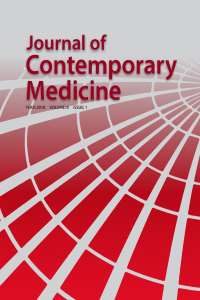Ratlarda Deneyse Olarak Oluşturulan İnfilamasyonla İlişkili Timpanoskleroza Alfa Lipoik Asidin Etkisi
Alfa-Lipoik asit, inflamasyon, fibroz
The Application of Lipoic Acid in Experimentally Induced Tympanosclerosis in Rats
alpha lipoic acid inflammation, fibrosis, fibrosis,
___
- 1. Pulec JL, Deguine C. Long-term ventilating tube with tympanosclerosis. Ear Nose Throat J. 2000; 79: 680. 2. Koç A, Uneri C. Genetic predisposition for tympanosclerotic degeneration. Eur Arch Otorhinolaryngol. 2002 ;259: 180-3. 3. Karlidag T, Ilhan N, Kaygusuz I, Keles E, Yalcin S. Comparisson of free radicals and antioxidant enzymes in chronic otitis media with and without tympanosclerosis. Laryngoscope 2004; 114: 85-9. 4. Mattsson C, Magnusson K, Hellstrom S. Myringosclerosis caused by increased oxygen concentration in traumatized tympanic membranes, experimental study. Ann Otol Rhinol Laryngol 1995; 104: 625-32. 5. Han D, Handelman G, Marcocci L, Sen CK, Roy S, Kobuchi H et al. Lipoic acid increases de novo synthesis of cellular glutathione by improving cystine utilization. Biofactors. 1997; 6: 321-38.6. Moini H, Packer L, Saris NE. Antioxidant and prooxidant activities of alpha-lipoic acid and dihydrolipoic acid. Toxicol. Appl. Pharmacol. 2002; 182: 84-90. 7. Packer L, Witt EH, Tritschler HJ. α-Lipoic acid as a biological antioxidant. Free Radic. Biol. Med. 1995; 19: 227–50. 8. Toklu HZ, Hakan T, Celik H, Biber N, Erzik C, Ogunc AV, et al. Neuroprotective effects of alpha-lipoic acid in experimental spinal cord injury in rats. J Spinal Cord Med. 2010; 33(4): 401-9. 9. Forse´ni M, Bagger-Sjöback D, HultcrantzM. A study of ınflamatory mediators in the human tympanosclerotic middle ear. Arch Otolaryngol Head Neck Surg. 2001; 127: 559-64. 10. Morgan WC. Tympanosclerosis. Laryngoscope 1977; 87: 1821-5. 11. Schiff M, Poliquin JF, Catanzaro A, Ryan AF. Tympanosclerosis. A theory of pathogenesis. Ann Otol Rhinol Laryngol Suppl 1980; 89: 1-16. 12. Forseni M, Bagger-Sjöback D, Hultcrantz M. A study of inflammatory mediators in the human tympanosclerotic middle ear. Arch Otolaryngol Head Neck Surg 2001; 127: 559-64. 13. Leal MC, Neto SSC, Caldas N, Peixoto CA, Lessa FJD, Leao BT, et al. Influence of hypercalsemia in the formation of tympanosclerosis in rat. Otol Neurotol 2005; 27: 27-32. 14. Tos M. Stangerup SE. Hearing loss in tympanosclerosis caused by grommets. Arch Otolaryngol Head Neck Surg 1989; 115: 931-5 15. Sheehy JL, House WF. Tympanosclerosis. Arch Otolaryngol 1962; 76: 151-7. 16. Tos M, Bak-Pedersen K. Middle-ear mucosa in tympanosclerosis. J Laryngol Otol 1974; 88: 119-26. 17. Costa SS, Paparella MM, Schachern PA, Yoon TH, Kimberley BP. Temporal bone histopathology in chronically infected ears with intact and perforated tympanic membranes. Laryngoscope 1992; 102: 1229-36. 18. Makiishi-Shimobayashi C, Tsujimura T, Sugihara A, Iwasaki T, Yamada N, Terada N, Sakagami M. Expression of osteopontin by exudate macrophages in infammatory tissues of the middle ear: a possible association with development of tympanosclerosis. Hear Res. 2001; 153: 100-7. 19. Bhaya MH, Schachern PA, Morizono T, Paparella MM. Pathogenesis of tympanosclerosis. Otolaryngol Head Neck Surg. 1993; 109: 413-20. 20. Polat S, Oztürk O, Uneri C, Yüksel M, Haklar G, Bozkurt S, et all. Determination of Reactive Oxygen Species in Myringotomized Tympanic Membranes: Effect of Vitamin E Treatment. Laryngoscope. 2004; 114: 720-5. 21. Albu S, Babighian G, and Trabalzini F. Surgical Treatment of Tympanosclerosis. The American Journal of Otology 2000; 21: 631-5. 22. Çakatay U. Pro-oxidant actions of α-lipoic acid and dihydrolipoic acid. Med Hypotheses. 2006; 66: 110-7. 23. Thirunavukkarasu V, Anuradha CV. Influence of alpha-lipoic acid on lipid peroxidation and antioxidant defence system in blood of insulin-resistant rats. Diabetes Obes Metab. 2004; 6: 200-7. 24. Arivazhagan P, Ramanathan K, Panneerselvam C. Effect of DL-alpha-lipoic acid on mitochondrial enzymes in aged rats. Chem Biol Interact. 2001; 138: 189-98. 25. Khanna S, Atalay M, Laaksonen DE, Gul M, Roy S, Sen CK. Alpha-lipoic acid supplementation: tissue glutathione homeostasis at rest and after exercise. J Appl Physiol. 1999; 86: 1191-6. 26. Cummings BP, Stanhope KL, Graham JL, Evans JL, Baskin DG, Griffen SC, et al. Dietary fructose accelerates the development of diabetes in UCD-T2DM rats: amelioration by the antioxidant, alpha-lipoic acid. Am J Physiol Regul Integr Comp Physiol 2010; 298: 1343-50.
- Yayın Aralığı: Yılda 6 Sayı
- Başlangıç: 2011
- Yayıncı: Rabia YILMAZ
Plasenta Previa Olgularının Retrospektif Değerlendirilmesi
Çiğdem KUNT İŞGÜDER, Selim GÜLÜCÜ, Yunus Emre BULUT, İlhan Bahri DELİBAŞ, Tuğba YURT, Asker Zeki ÖZSOY
Çocuklarda Helicobacter pylori enfeksiyonu ve antral nodülerite
Nafiye URGANCI, Derya KALYONCU, Banu YILMAZ ÖZGÜVEN
Kanser Hastalarının Manevi Gereksinimlerini Değerlendirmeye İlişkin Ölçek Çalışmalarının İncelemesi
Hematoloji polikliniğinde Gaucher Hastalığı
Didar YANARDAĞ AÇIK, Bilal AYGUN
Kanserli çocuğu olan ebeveynlerin ilaç hatalarına ilişkin algıları
Elif BİLSİN, Hatice BAL YILMAZ, Gülçin ÖZALP GERÇEKER, Şeyda BİNAY, Zümrüt BAŞBAKKAL
Serebral Kitlesel Lezyonların Ayırıcı Tanısında Manyetik Rezonans Spektroskopik İnceleme
Şerife LEBLEBİSATAN, Yunus Kenan BIÇAKCI
